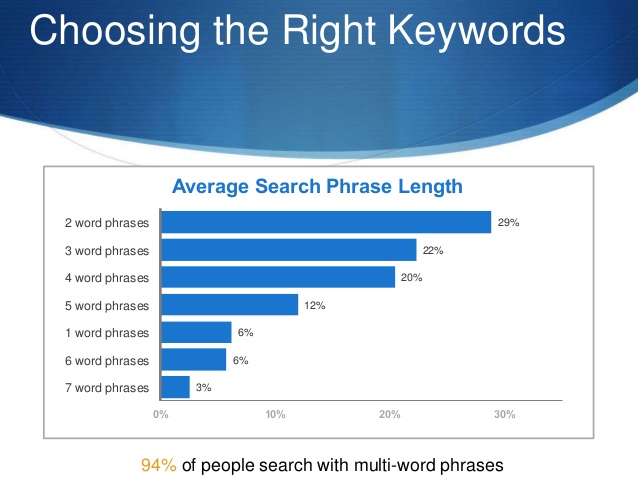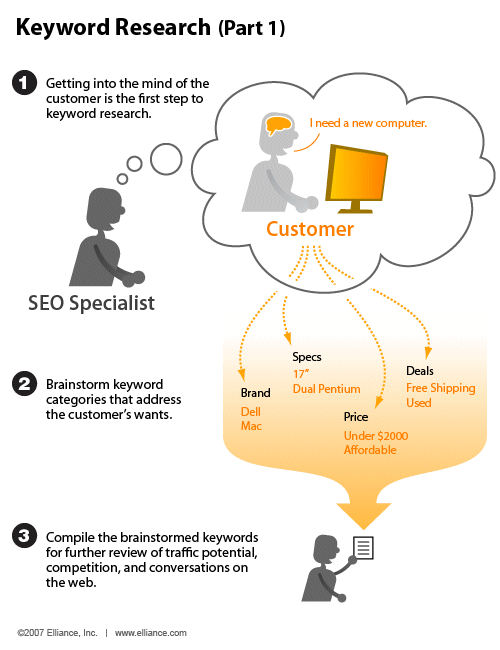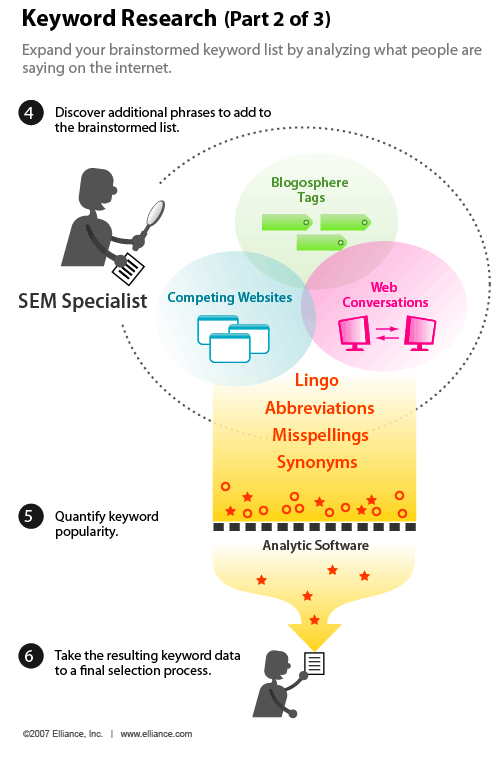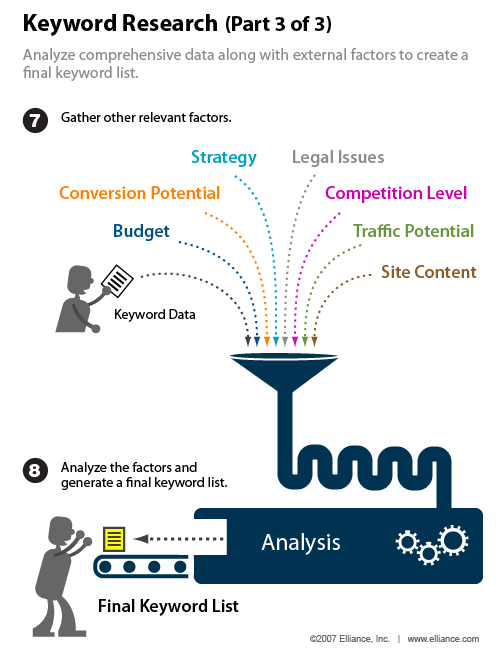How do I find the right keywords for my website or web page
There are three general ways that people search for something they need or want on their phones or desktops.
They open up their browser, go to Google, Yahoo or Bing and they either type in a keyword, keyword string or they ask the search engines a question. Keywords Strings are the #1 determining component of a successful returned result from the search engines. Questions would be #2 and a single keyword would be next in line.
 Example of what someone would type if they were looking for boots:
Example of what someone would type if they were looking for boots:
- Keyword - boots
- Keyword String (also knows as keyword phrase) - red leather boots
- Keyword Question - where can I buy red leather boots in kansas city
How do keywords work? | Understanding the Nature of People
If we look at the Internet as the worlds solution provider you can better understand how you would react with your target audience. People are looking for solutions to their everyday wants and needs and thus interact with the search engines in the same manner. Products are the prime target for keywords, keyword strings and services, though they do target keyword strings and keywords, they do allot better by addressing the problem with a solution they offer in the form of a question.
Scenario 1 - For example, someone might be looking for a "plasma tv" which would bring up a huge result. If you are selling plasma tv's then this is a keyword you would want to target. However, they might me looking for something more specific like a "62 inch plasma tv" thus is your keyword string. If you are a plasma tv service provider you would get more results with creating a page focused around "how do I setup my new plasma tv" then you would targeting the keywords by themselves.
As we learn to think like our target audience it becomes more clear that just a single keyword might not cut it. We have to think like the person on the other end of the search engine and try to anticipate what they would type in to find YOU.
I wrote an article called "How to Create Quick Landing Pages that Drive Traffic". In this article I talk about how to get your keywords that you want to rank for (could be 200+ words) and to create quick landing pages for those words. This is a great keyword strategy but I am now convinced more than ever that combining those keywords in a question format returns more results with better conversion rate then just a page with one to two-word keywords targeted.
Scenario 2 - We provide Joomla Web Development Services. Yes we rank for lots of Joomla keywords and yes they bring traffic but at the end of the day are they causing us to convert those people into customers? So I tested this theory and created a page called "Why Joomla". This was a keyword that was targeted by thousands. In this article I talk about the benefits of the Joomla Content Management System. This page has brought quite a bit of traffic. Yes, I admit, though this page is original content, its like some many others out there. So in evaluating this page, I decided that I was not providing the answer to the real question that my audience is asking. What they really want to know is "Why should I choose the Joomla CMS for my website wevelopment needs versus the Wordpress Blog System? Notice, I still have the keywords "why Joomla" but I added more. This is going to give me two benefits.
- It gives me more keywords to rank for instead of just "why Joomla". Example: They may also find me if they search for "why Joomla website" or "why Joomla cms"
- I am now answering their real question, providing statistics and then offering a call to action for them to call to discuss their website needs.
Bottom line - My theory was correct and I am getting 75% more hits on my second page which asks a question versus my page that only targets a keyword.

How do I choose the right keywords for my site?
There are three steps to take to getting the right keywords for your site.
- Step 1 - Breaking down your product and service offerings
- Step 2 - Research who your top 10 competitors keywords are
- Step 3 - Using a keyword tool to get your keywords
Keyword Strategies



Step 1 overview - I wrote an article once about buying a multi-sized universal usb charger that had several type end-extensions. Before I wrote the article I had to think about why someone would buy this and how best to grab their attention. Once I began to think who would buy it and why, I pulled out a pen and paper and the list followed us such.
People interested in buying a universal charger:
- might be looking to buy it for when they travel
- might be needing it for their mobile office
- might have several devices such as cell phone, camera, external hard drive
- might be a tool for a computer technician
This type of thinking helped me to put myself in my potential buyers shoes. Again, people are looking for a solution to their need so this type of forethought helps gauge the direction of your web page with they keywords used in online search queries. This line of thinking also helped me come up with keyword terms I would never have thought of. Its not as important to have a page called "USB Charger" with this keyword throughout your page as it is to solve the problem of the person that is searching for a "USB Travel Charger for on the go Cell Phone Charging".
- Jotting down my thoughts on who wanted to buy a usb charger and why they
wanted to buy them, I was able to break down keywords into categories. Category
1) Business Travel, 2) Mobile Office, 3) Technician Tools and 4) Usability (such
as computer tools, travel charger, car charger, office, business, cameras etc).
Grouping your keywords in this way can
help narrow the categories down that you'd wish to derive keywords from. So
now in step 3 below, I can use a tool like Google AdWords: Keyword Tool to search
these specific categories for keywords.
- Using the tool I came up with several possible keyword combination (usb drives, laptop charger, mp3 charger, quick charge, bluetooth, computer, video camera, etc) that I may not have thought about on my own. Even if I don't use all these phrases as my main keywords, I can still work them into my article as synonyms and alternate terms so that people searching for them will find my article.
Step 2 keyword research
Its always a good idea to find out who your direct competitors are and to view the page rank of their web pages and the keywords and strategy they use on their website. If you are serious about getting your keywords right the first time and aligning yourself with your competitors then I would highly suggest a one months subscription to SpyFu. This is an unbelievable and easy to use SEO tool that will help you define what your competitors keywords are and how they are using them. Remember, the only way to outrank and climb the latter to the top 10 search on Google is to mimic what your competition is doing and then do it better and more of it. You can do this with SpyFu.
Step 3 keyword tool
This free Google Keyword Research Tool is invaluable. It allows you to enter in a keyword you want to rank for and then it returns all the variations of that keyword. It also shows you how many people have searched for those keywords. Tip: when you get your list of keywords from Google, its as important to write articles for keywords that had a few searches as well as the highly searched keyword terms.
- From your list of researched keywords that you have now, narrow down your
main keywords to two or three keyword strings or phrases. These will become
your main keywords that you're trying to rank well for.
- If you're looking to find the maximum number of readers for your article,
then you'll want to sort your keywords according to volume. If you run ads which
relate to your article, then you'd want to choose keywords that have a high
earnings potential (CPC). In most cases, it's best to have a middle-of-the-road
strategy and choose keywords that have a good amount of volume and pay well.
The actual numbers that work well for you will depend on your niche and SEO
goals.
- The most important place where your top-primary
keyword needs to go is the title tag, description tag and the first paragraph
on your web page. Next up is the sub-title or lead paragraph, where you can
usually put your secondary keywords.
Use your keywords in other prominent places of your article such as sub-headings
(h-tags), anchor text links, images, as well as the first and last paragraph
of your article.
Using these simple steps, you can choose keywords that not only rank well and pay well but also use those that are human reader-friendly and natural-sounding in your article. Your keyword research will hit the mark if your reader benefits from your article and your client (or your blog) benefits from targeted and relevant traffic.
At The Turn Group, we research competitors and keywords all day long. With time, success and failure, research and testing, you can implement your own keyword strategy or we can assist you. If you would like for us to analyze your website for feedback and suggestions we would be more than happy to help.
When you subscribe to the blog, we will send you an e-mail when there are new updates on the site so you wouldn't miss them.
Offices in:
Greater
Kansas City,
MO Area
By Appointment Only!

